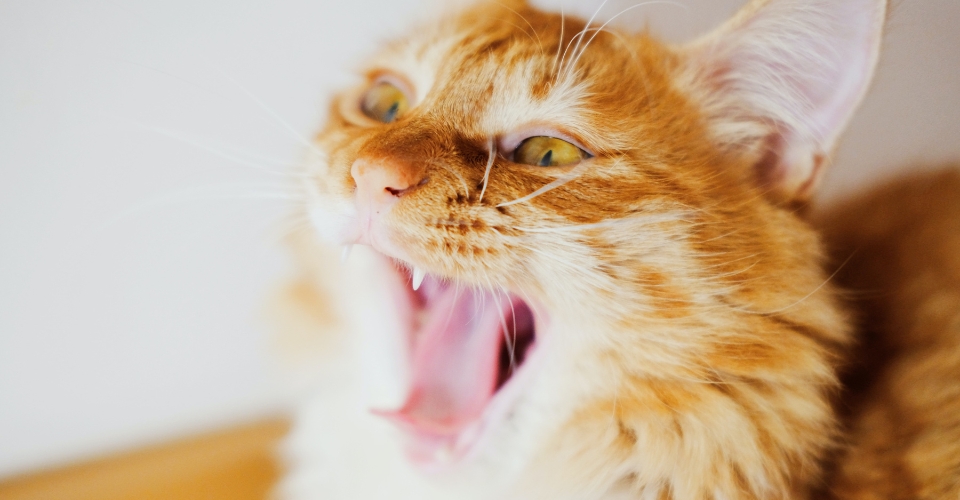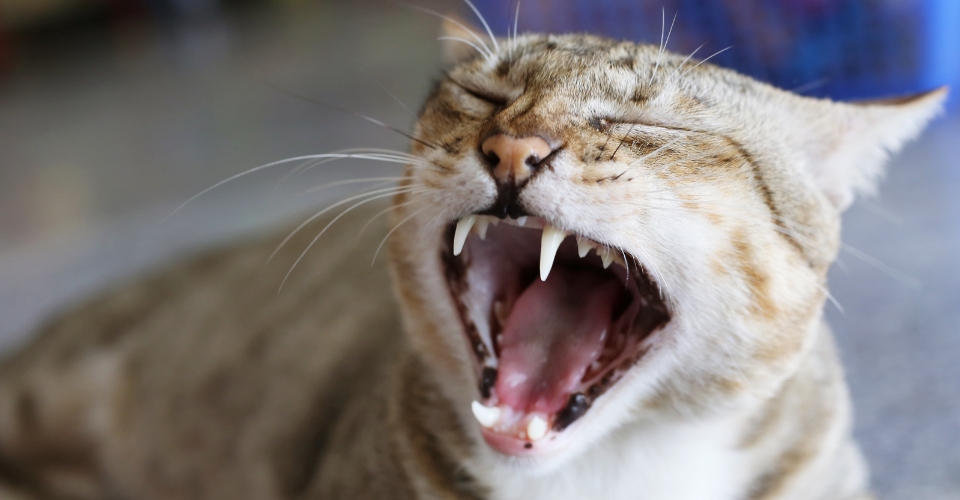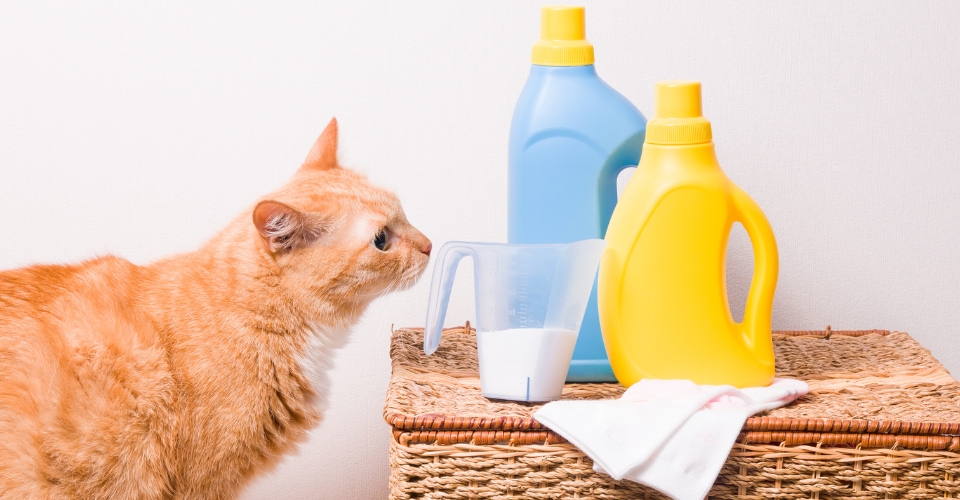Cats are curious and mischievous little creatures. They own the house they are living in—you are just paying the rent. They are kings and queens of our homes, and no corner of the house is out of their bounds. While watching your cat treating your house like a jungle and shelves like trees could be entertaining, sometimes cats may get into trouble.
For instance, a cat jumping on the kitchen counter and ingesting some human food that cats should not eat would be worrisome. Similarly, if your cat were one of a kind and, unlike most cats, loves playing with water and spending time in the kitchen sink, there would be a risk of the cat ingesting dish soap, licking something off the dish, and getting sick.
You do not want that to happen, so you want to keep your cat away from the kitchen sink. But how to go about it? How to keep cats out of the sink and kitchen counter?
Though being fastidious, cats keep themselves clean, the chances of bacteria and germs spreading through cat feet are always there. After all, cats walk on the same feet they use in the litter box – and no one wants such microbes in their kitchen. Or, you might have chocolate, alcohol, or yeast in your used utensils placed in the sink, which can be harmful to your pet if she ends up licking it.
How to Keep Cats Out of the Sink? 12 Workable Tips
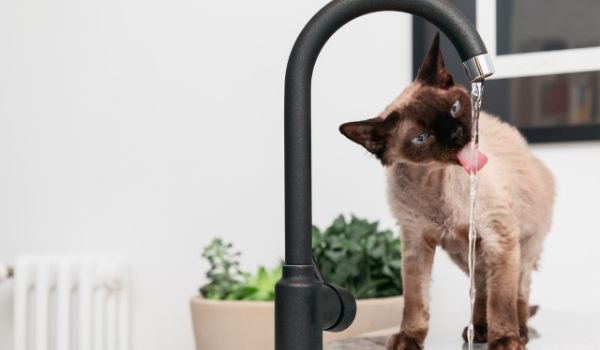
The strategy to keep cats off the kitchen sink stands on two pillars: the modification of the kitchen and training of the cat. You need to apply the series of easy-to-do changes in your kitchen while teaching your kitty that the kitchen is a no-go zone for her. Before we begin, you should know that the key to success in a cat’s behavioral change is consistency.
1. Cut off the Route
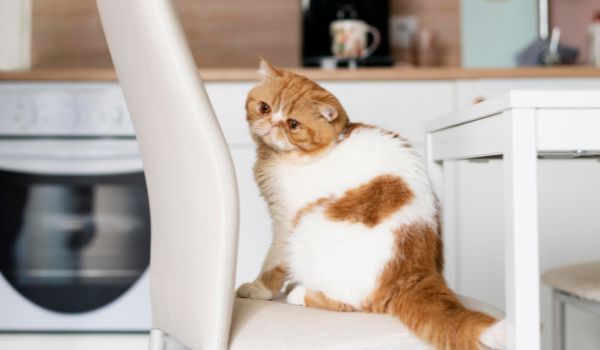
Being prudent and making it a priority, you must remove all items near the sink that may facilitate your cat from reaching it. For instance, if there is a chair nearby, your cat might use it to make her climb easier; you must remove it to make the climb tougher.
2. Remove Temptations
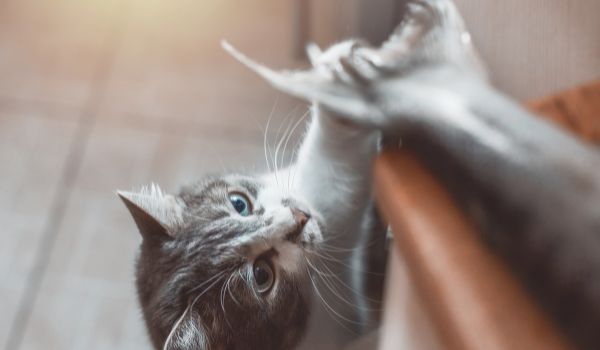
It is hard for cats to resist food. So, if you do not want your kitty to climb into the kitchen sink, you should not leave any food in the sink or around it on the counter. Maintain the habit of keeping it clean. Do not let used dishes sit in the sink for long, or your feline friend may decide to do the dishes for you. And if there is any leftover food in the dishes sitting in the sink, know that your cat will ascend to the sink and lick it clean.
3. Use Sticky Substances
Cats hate encountering sticky substances because they lose their sensation and hate the feeling of their paws being adhesive. Such loathness could be because cats have to use their paws for daily activities, and thus they do not tolerate any harm to them.
You can use cats’ hatred for sticky substances to keep her away from the sink or kitchen counter by applying sticky tape around the counter or sink. Unless your cat outsmarts you and figures out a way to the sink without encountering the sticky tape, this would be effective in keeping the cat out of the kitchen sink.
4. Apply Aluminum Foil
Wrap the counters leading to the sink in aluminum foil. Most felines do not like the sound aluminum foil makes when it clicks under their paws because it reaches the ultrasonic range. But there is a drawback: it is a limited-time offer, and cats may eventually get rid of their fear of the aluminum foil – converting it into aluminum ‘fail.’
5. Employ Sandpaper
Cats do not like the feel of abrasive material under their feet. Try placing sandpaper near the sink when you are not using it. If it gets wet, you must replace it with a dry one because the wet sandpaper cannot be as effective in deterring cats.
6. Give Alternate

Since cats usually love climbing in high places, you should invest in cat trees. This will not only keep your cat away from the sink but her craving to ascend will also be utilized healthily and positively. To make your whole kitchen secure from your cat and not just the sink, you can go for outdoor cat trees. Just place it in a nice, sunny place and let your kitty enjoy it in peace. If your cat is always indoors, you can get her a cat window perch. And if your kitty is going into the sink to play with water coming from the tap, you can get your kitty a water fountain.
7. Click on Clicker Training
Clicker training can work wonders for keeping cats away from the sink. Whenever you find your kitty wandering over the sink, offer her cat treats by either throwing them near the sink or on the floor nearby. Once she gets the reward, let the clicker go off. Thanks to the power of treats, once accustomed to the clicker phenomenon, your cat can easily get off the sink whenever you engage her.
8. Make Noises
Cats stay relaxed and easygoing in a calm and quiet environment and can run off upon hearing a loud noise. When your cat aims for the sink, try saying “No!” loudly and emphatically. Likewise, you can also fill a container with coins and shake it when she reaches the sink. The shrill sound of it can deter your kitty effectively.
Be Careful!
A sharp noise of about 120 dB can cause hearing damage to cats.
9. Spray Water
Cats are afraid of water—most of them. But almost all cats hate getting sprayed in the face. So, you can keep a bottle of water in the kitchen and spray it on your kitty whenever she comes near the sink. But never overdo it.
Some experts also believe that mixing the water with peppermint can enhance deterrence.
10. Utilize Commercial Repellants
Fortunately, several commercial products like cat shock collars are available to keep cats away from the places where you install them. You can also use them in your kitchen to keep your cat out of the places like the sink. Cat collars may sound cruel, but there are some really good options, some even don’t use any kind of shock.
There are other options available as well, such as the cat repellent mentioned below.
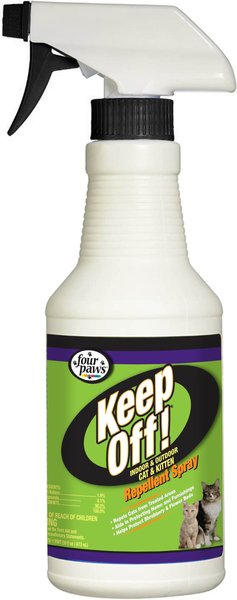
|
It keeps cats away from the places where you apply it effectively for up to 24 hours. The best part is that it does not leave any stains. |
11. Revisit Water Sources
If your cat comes to the sink for the sake of drinking water from the faucet, it might be due to the faulty or dirty water resources she already has. For example, if her water fountain is not clean or deters her from using it due to any reason, she might naturally go for faucets to get fresh and cool water. Make sure that the water is always available for your kitty and that the faucet does not keep running unnecessarily to tempt her.
12. Seek Help
As a last resort, you can take the help of a feline behaviorist. The behaviorist will, most likely, visit your home and assess the situation. Some medication or therapy may be recommended for sure results to keep your pet off the sink.
Never Do This…

Yes – keeping your cat off the kitchen sink is necessary for the safety of your kitty as well as yours. But you should never go beyond certain extents. It can impact your relationship with the pet.
- Do not use any deterrent that can impact the health of your pet.
- Never punish your cat. Being vocal and shouting for getting near the sink is fine to some extent, but getting physical is never an option. Eventually, she might start avoiding not the kitchen but you as well.
- Pushing your kitty off the sink forcefully can increase the risk of injury. You should restrain resorting to the use of force of any kind.
Did You Know?
According to Jackson Galaxy, a cat behaviorist, when you repeatedly try to harm your cat, she may develop serious behavior problems such as phobias and can cause more harm than good.
Why Are Cats Crazy for the Sink? 5 Possible Reasons
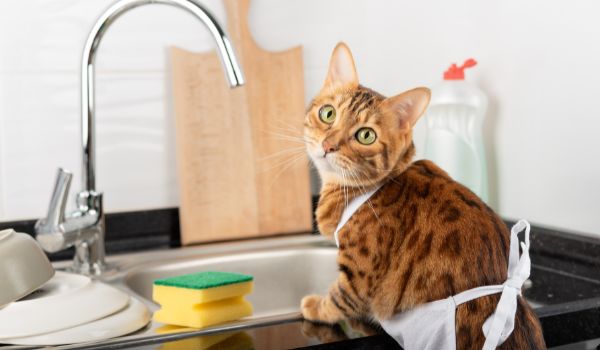
It seems like cat behavior can never be completely understood by human beings for eons to come. What we can only do is make a guess why is there so much attraction in the kitchen sink for your cat. Having known the potential causes, you can devise DIY ways to keep your cat off it, maybe?
1. That Heavenly Aroma!
You might have leftover food particles on the utensils you have placed in the sink. As discussed, it is a big attraction for cats, especially if you have just finished eating what these carnivores crave the most: turkey, chicken, and tuna. Having a sense of smell 14 times stronger than that of human beings, cats are sure to follow the food smell they get from the sink.
2. The Demand for Elevation
The majority of cats love being in high places. Be it a tree, rooftop, windows, or furniture, kitties want to sit on the top of them as if they are the owners. Since sinks are a couple of feet high, they become a natural target for cats.
3. Love for Running Water
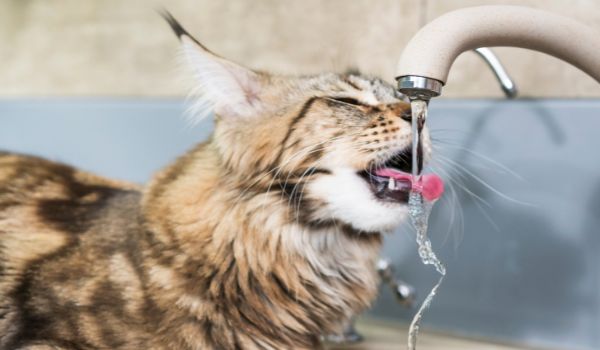
Cats are domesticated animals. They usually came across running water in the wild, says a stream or a river, whenever they wanted to quench their thirst. Hence, it feels more natural to them when they drink from a running faucet rather than going for still water in a bowl. Moreover, their whiskers may collide with the bowl when drinking from it, making it an unpleasant experience. Perhaps, it is one of the many reasons why cats splash water out of the bowl.
4. ‘Curiosity Kills the Cat’
Cats are our most curious buddies. Anything, literally, even a sink, can invoke curiosity in your cat. She might want to climb on the top of it and observe what goes on there. And to put the icing on the cake, if you have a window or any other attractive item nearby the sink, the interest of your cat in it will multiply.
5. Pal, I Need Your Company

We live in busy times. We might spend most of our time outside our homes, and when we come back, we have a lot of chores waiting for us. Eventually, we do not get enough time to spend with our kitty friends. When you do the dishes, your cat may walk up to you, trying to take a share of your time. In this quest, it is normal for her to climb on the sink to feel your nearness.
Final Words: How to Keep Cats Out of the Sink?
Although cats tend to ascend the kitchen sink due to various reasons, keeping them off is in the best interest of both the cats and their owners. The key to doing it successfully lies in making smart moves such as blocking your cat’s access to the sink while training her not to climb it simultaneously. Getting your cat to stay out of the kitchen sink could be hard, especially if she was previously allowed to play around the sink, but you should never lose your temper and be harsh to your cat as it could damage your relationship with your feline pal.



